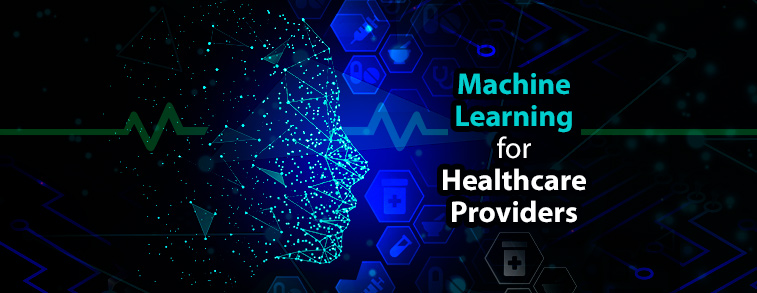Machine Learning for Healthcare Providers


Machine Learning for Healthcare Providers

The healthcare industry has long been an early adopter of technological evolution and advancements. Off late, Machine Learning (ML, a subset of Artificial Intelligence [AI]) has started playing a key role in many healthcare related areas, including discovering links between genetic codes to improve patient outcomes, treatment of chronic diseases, healthcare specific power process automation or even for maximizing hospital operational efficiency. ML approach focuses on developing algorithms/ statistical models that can automatically estimate unseen patterns hidden in medical data.
Sebastian Thrum, a computer scientist and founder of Udacity once said “Just as machines made human muscles a thousand times stronger, ML (machine learning) will make the human brain a thousand times more powerful.”According to a latest survey, AI in healthcare market was valued at $4.8 billion in 2019 and is projected to reach $99.5 billion by 2027, registering a CAGR of 42.8% over the next seven years.
In one of my earlier blogs, I had mentioned that an appropriately designed and implemented AI/ ML solution could be a boon to healthcare organizations and had shared a few relevant use cases.
A team of data scientists & developers at Aress Software have built, tested and optimized predictive models that could assist healthcare providers with improved clinical decision-making:
- ML in Chronic Kidney Disease (CKD) Prediction – CKD is a slow and periodical loss of kidney function over a period of several years. Such a patient may face a risk of permanent kidney failure. If CKD is not detected and cured in early stage, then patient has a risk to his/ her life. Aress team worked on 900 patient records containing 25 attributes and used Decision Tree, Support Vector Machine (SVM) to build prediction models providing an accuracy of 91%. In such cases, higher amount of available data would result in increasing the prediction accuracy further.
- ML in predicting Mental Health Disorders – Mental health disorder is a type of health condition that changes a person’s mind, emotions or behaviour or all three. It has been shown to impact an individual’s physical health. World-wide depression is a leading cause of disability and can lead to an increased risk for suicidal ideation and suicide attempts. Aress team worked on 2000 observations containing 27 attributes and used Random Forest & KNN (K-Nearest Neighbours) algorithms to build prediction models providing an accuracy of 90%.
Apart from these, Aress team has also been working on gnome clustering analysis, cardiovascular disease prediction, brain tumour analysis, diagnosis of liver disease & Alzheimer prediction models wherein apart from machine learning, deep learning techniques too are leveraged to improve prediction accuracy and outcomes.
The increasing intricacy and rise of available data in healthcare means that AI will increasingly be applied within the field. For more information about AI/ advanced analytics and benefits of implementing it for your organization visit us.
Category: GenAI & Data Engineering
Recent Posts
-
GenAI & Data Engineering
From ‘Back-Office’ to ‘The Heart of the Business’
-
GenAI & Data Engineering
Aress OrderIt: Building an Intelligent Quick Commerce Delivery Platform with AI-Powered Optimization
-
24x7 Technical Support
Top 10 MSP Trends Driving Scale, Security, and Profitability in 2026
-
GenAI & Data Engineering
The 2026 Blueprint: 4 Pillars of Effective Cloud Data Management
-
Digital
Why Traditional QA Audits Fail at Scale in Contact Centers
 +91 253 6630710
+91 253 6630710 781.258.1274
781.258.1274 +44 (0) 7446 87 37 97
+44 (0) 7446 87 37 97